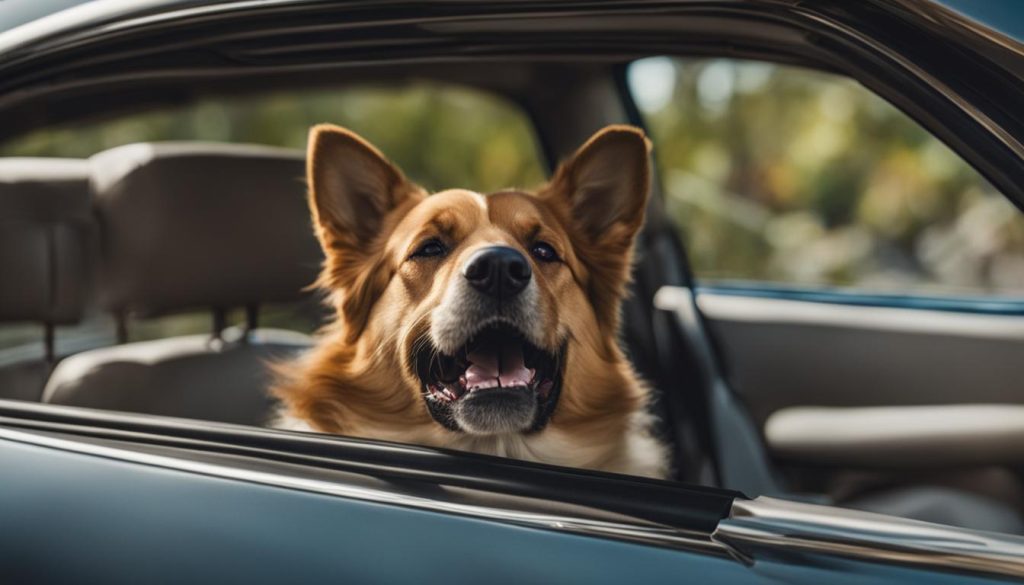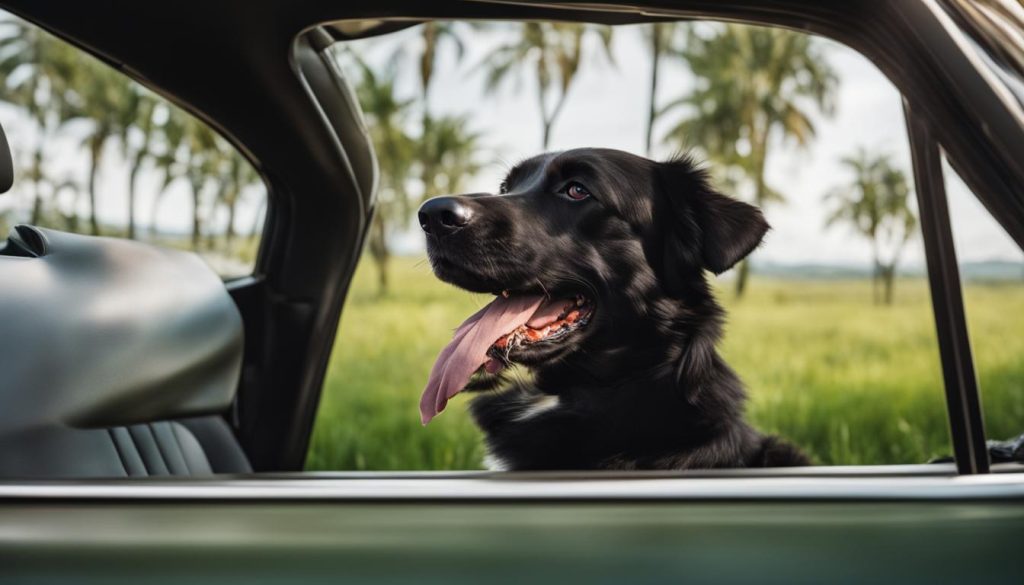Dog car sickness can be a distressing experience for both dogs and their owners. The sight of our furry companions feeling nauseous and anxious during car rides can break our hearts. But what exactly causes this condition? And how can we help our dogs overcome it?
In this article, we will delve into the signs and causes of dog car sickness, explore the available treatments, and discuss preventive measures to ensure a stress-free travel experience for our canine friends. Whether you’re dealing with motion sickness, travel anxiety, or underlying medical conditions, understanding the factors at play is crucial to addressing the issue effectively.
Key Takeaways:
- Recognize the signs and symptoms of dog car sickness, such as drooling, panting, vomiting, and diarrhea.
- Understand the various factors contributing to dog car sickness, including inner ear abnormalities, anxiety, stress, and underlying medical conditions.
- Explore treatment options, such as medication, natural remedies like ginger and CBD oil, and probiotics.
- Learn how to prepare your dog for car rides through positive reinforcement, car training, and creating a calm environment.
- Implement preventive measures like keeping the dog on an empty stomach, taking breaks, and allowing fresh air circulation in the car.
Factors Contributing to Dog Motion Sickness
Dog motion sickness can be influenced by various factors, including inner ear abnormalities, anxiety and stress, and underlying medical conditions. Understanding these factors can help pet owners address and manage their dog’s car sickness effectively.
Inner Ear Abnormalities
Dogs with inner ear abnormalities may experience a lack of balance, which can increase the likelihood of motion sickness during car rides. The inner ear plays a crucial role in maintaining balance and equilibrium, and any abnormalities can disrupt this delicate process, leading to symptoms of car sickness.
Anxiety and Stress
Anxiety and stress can exacerbate motion sickness in dogs. If dogs associate the car with negative experiences or feel anxious during travel, it can trigger symptoms of car sickness. Creating a calm and positive environment in the car and utilizing techniques such as desensitization and positive reinforcement can help reduce anxiety and alleviate motion sickness.
Underlying Medical Conditions
Some dogs may have underlying medical conditions that contribute to their car sickness. Gastrointestinal issues, such as irritable bowel syndrome or other digestive disorders, can increase the risk of nausea and vomiting during car rides. Additionally, dogs with ear infections or other ear-related issues may be more prone to experiencing motion sickness due to the connection between the inner ear and balance.
By addressing these factors, pet owners can take proactive measures to alleviate their dog’s motion sickness. Consulting with a veterinarian can provide valuable insights and recommendations for managing and treating dog car sickness effectively.

Signs and Symptoms of Dog Car Sickness
Dogs may exhibit various signs and symptoms when experiencing car sickness. I highly recommend dog owners to be able to recognize these signs in order to provide the necessary care and support to their furry companions. Some common signs of dog car sickness include:
- Drooling
- Panting
- Yawning
- Pacing
- Whining
- Swallowing
- Lip-licking
- Lethargy
- Hunched back
- Wide eyes
These physical signs can be accompanied by additional symptoms such as vomiting, diarrhea, changes in body posture, and facial muscle tension. You should note that not all dogs will display the same signs, and the severity of symptoms can vary from mild discomfort to more severe distress.
Recognizing these signs and symptoms can help dog owners identify if their furry friend is suffering from car sickness and take appropriate actions to provide relief and comfort. It is recommended to consult with a veterinarian for a proper diagnosis and to discuss treatment options to help alleviate the symptoms of dog car sickness.

Table: Common Signs and Symptoms of Dog Car Sickness
| Signs | Symptoms |
|---|---|
| Drooling | Vomiting |
| Panting | Diarrhea |
| Yawning | Changes in body posture |
| Pacing | Facial muscle tension |
| Whining | |
| Swallowing | |
| Lip-licking | |
| Lethargy | |
| Hunched back | |
| Wide eyes |
Treating Dog Car Sickness
Dog car sickness can be managed and treated through various approaches. Medications, natural remedies, and alternative supplements can all play a role in alleviating the symptoms and making car rides more comfortable for your furry friend.
Medications for Dog Car Sickness
If your dog experiences severe car sickness, your veterinarian may prescribe medications to help control the symptoms. The most commonly prescribed medications for dog car sickness include:
| Medication | Description |
|---|---|
| Cerenia | A prescription medication that blocks signals in the brain responsible for triggering nausea and vomiting. |
| Meclizine | An antihistamine commonly used to treat motion sickness in dogs by reducing dizziness and nausea. |
| Dimenhydrinate | Another antihistamine that can help alleviate motion sickness symptoms in dogs, such as vomiting and nausea. |
| Diphenhydramine | An over-the-counter antihistamine that is occasionally used for its sedative properties to calm dogs during car rides. |
You should note that these medications should only be given under the guidance of a veterinarian. Dosage and administration instructions should be followed carefully to ensure your dog’s safety.
Natural Remedies and Supplements
For pet owners looking for natural alternatives to traditional medications, several options can help ease dog car sickness:
- Ginger: This natural remedy can help soothe the stomach and alleviate nausea. You can give your dog ginger treats or use powdered ginger in their food before car rides.
- CBD: Cannabidiol (CBD) oil has gained popularity for its potential to reduce anxiety and nausea in dogs. However, it is good practice to consult with your veterinarian to ensure proper dosage and safety.
- Probiotics: Probiotic supplements can promote a healthy digestive system and help reduce gastrointestinal issues that may contribute to car sickness. Talk to your veterinarian about incorporating probiotics into your dog’s diet.
While these natural remedies and supplements may show positive effects in some dogs, it is essential to consult with a veterinarian before introducing them to your pet’s routine.

In conclusion, there are various treatment options available to help manage dog car sickness. Medications prescribed by a veterinarian can effectively alleviate symptoms, while natural remedies and supplements like ginger, CBD oil, and probiotics may offer alternative solutions. You should consult with a veterinarian to determine the most suitable treatment approach for your dog’s specific needs. By addressing car sickness, you can ensure a more comfortable and enjoyable travel experience for your furry companion.
Preparing Your Dog for Car Rides
Proper preparation is essential for helping your dog overcome car sickness and ensuring a comfortable and stress-free car ride. By implementing positive reinforcement techniques and car training, you can create a positive association with the vehicle and desensitize your dog to the sensations of movement.
One effective approach is to start with short trips and gradually increase the duration of the car rides. This gradual exposure helps your dog become more accustomed to the motion and reduces anxiety. Try to praise and reward your dog for their calm behavior in the car, reinforcing positive associations.
Creating a calm car environment is also key. Ensure fresh air circulation by partially opening windows or adjusting the air conditioning. This can help alleviate any feelings of stuffiness or discomfort. Additionally, providing a comfortable and secure space for your dog, such as a crate or a comfortable seat, can help them feel more at ease during the ride.

To put it simply, every dog is unique, and tailor your approach based on their individual needs and comfort levels. Consulting with a professional dog trainer or veterinarian can provide valuable guidance and support, ensuring that you and your furry friend have a pleasant and enjoyable car travel experience.
Preventing Dog Car Sickness
Preventing dog car sickness is essential for ensuring a comfortable and stress-free travel experience for your furry friend. By implementing a few simple strategies, you can help reduce the risk of car sickness and make car rides enjoyable for both you and your dog.
Keeping an Empty Stomach
One effective way to prevent dog car sickness is to keep your dog on an empty stomach before a car ride. Feeding your dog a light meal a few hours before the journey can help reduce the likelihood of nausea and vomiting. Avoid giving your dog a large meal right before the car ride, as this can increase the chances of car sickness.
Taking Frequent Breaks
During longer car trips, you should take frequent breaks to allow your dog to stretch their legs and relieve any anxiety they may be experiencing. Regular breaks not only help prevent car sickness but also provide an opportunity for your dog to explore their surroundings and release pent-up energy.
Ensuring Fresh Air and De-stressing
Proper ventilation is crucial for dogs during car rides. You can partially open the car windows or adjust the air conditioning to maintain a steady flow of fresh air. Additionally, creating a calm and relaxing environment inside the car can help reduce your dog’s anxiety. Consider playing soothing music or using calming pheromone sprays to create a stress-free atmosphere.
Conditioning Your Dog
Gradual exposure to car rides and positive reinforcement can help condition your dog to associate car travel with positive experiences. Start by taking short trips around the block and gradually increase the duration of the rides. Reward your dog with treats and praise for calm behavior during the journey. This conditioning process can help your dog feel more comfortable and less prone to car sickness.

By following these preventive measures, you can significantly reduce the risk of dog car sickness and make your travel adventures with your canine companion more enjoyable. Try to always consult with your veterinarian for personalized advice and guidance on managing dog car sickness effectively.
Dealing with Travel Anxiety in Dogs
Travel anxiety in dogs can be a challenging issue to manage. It can manifest in various ways, such as restlessness, excessive panting, trembling, and even aggression. Understanding the causes of travel anxiety is crucial in finding effective methods to alleviate it and create a more positive travel experience for your furry friend.
One common cause of travel anxiety in dogs is past negative experiences. If a dog has had a traumatic car ride, they may associate the car with fear and discomfort. Infrequent car rides can also contribute to anxiety, as dogs may feel unfamiliar and uneasy in a moving vehicle. Additionally, stressful destinations, such as unfamiliar places or the veterinarian’s office, can further trigger anxiety in dogs.
To alleviate travel anxiety in dogs, several strategies can be employed. Positive reinforcement is a powerful tool to create positive associations with the car. Offering treats, praise, and rewards while your dog is in the car can help build confidence and reduce anxiety. Desensitization techniques, such as gradually introducing your dog to short car rides and gradually increasing the duration, can also help them become more accustomed to the sensations of movement.
In more severe cases, anti-anxiety medications prescribed by a veterinarian may be necessary to help dogs cope with travel anxiety. These medications can help reduce anxiety symptoms and promote relaxation during car rides. However, work closely with your veterinarian to determine the appropriate medication and dosage for your dog, as each dog’s needs can vary.

Alleviating Travel Anxiety: Quick Tips
- Use positive reinforcement to create positive associations with the car.
- Gradually expose your dog to car rides, starting with short trips and gradually increasing duration.
- Create a calm and comfortable environment in the car, with familiar items and soothing music if necessary.
- Consider using anti-anxiety medications prescribed by a veterinarian in severe cases.
- Consult with a professional dog trainer or behaviorist for additional guidance and support.
Travel anxiety in dogs can be distressing for both the dog and their owner. By understanding the causes of travel anxiety and implementing appropriate strategies, it is possible to help dogs overcome their anxiety and enjoy car rides more comfortably. Try to be patient and consistent in your approach, and always seek professional advice when needed to ensure the well-being of your furry companion.
Addressing Underlying Medical Conditions
When it comes to dog car sickness, I would advise that you consider the presence of underlying medical conditions that can contribute to this issue. Two common conditions that may increase the risk of car sickness in dogs are ear infections and gastrointestinal issues. By understanding and addressing these conditions, we can help alleviate the symptoms and make car rides more pleasant for our furry friends.
Ear Infections and Car Sickness
Ear infections can disrupt a dog’s sense of balance and spatial orientation, making them more susceptible to motion sickness. The inner ear plays a crucial role in maintaining equilibrium, and any infection or inflammation in this area can cause dizziness and nausea. If your dog has a history of ear infections or shows signs of discomfort in their ears, please seek veterinary care. Treating the underlying ear infection can not only improve their overall well-being but also reduce the likelihood of car sickness.
Gastrointestinal Issues and Car Sickness
Gastrointestinal issues, such as inflammation, ulcers, or other digestive disorders, can also contribute to car sickness in dogs. These conditions can cause nausea, vomiting, and discomfort during car rides. If your dog experiences frequent episodes of car sickness, I would advise that you consult with a veterinarian to rule out any underlying gastrointestinal issues. Proper diagnosis and management of these conditions can lead to a significant improvement in your dog’s car travel experience.
| Condition | Symptoms | Treatment |
|---|---|---|
| Ear Infections | Dizziness, head shaking, ear discharge | Antibiotics, ear drops, cleaning |
| Gastrointestinal Issues | Nausea, vomiting, diarrhea | Dietary changes, medication, probiotics |
Proper veterinary care and treatment for underlying medical conditions are crucial steps in addressing car sickness in dogs. By addressing these conditions, we can help our furry companions feel more comfortable and enjoy car rides without the unpleasant symptoms of car sickness.

Final Thoughts
In conclusion, understanding and addressing dog car sickness is essential for ensuring a stress-free and comfortable travel experience for your canine companion. By recognizing the signs and causes of car sickness, you can take appropriate steps to alleviate symptoms and prevent future episodes.
Factors such as inner ear abnormalities, anxiety, stress, and underlying medical conditions can contribute to dog car sickness. Consulting with a veterinarian is crucial in determining the best treatment options, which may include medication, natural remedies, or behavioral techniques.
Preparing your dog for car rides through positive reinforcement, car training, and creating a calm environment can help desensitize them to the sensations of movement and reduce travel anxiety. Additionally, taking proactive measures such as keeping dogs on an empty stomach, taking breaks, and allowing fresh air circulation can help prevent car sickness.
Overall, addressing dog car sickness requires a comprehensive approach that considers the individual needs and health of each dog. With the right strategies and guidance from a veterinarian, you can help your furry friend overcome car sickness and enjoy a more enjoyable and stress-free travel experience.
FAQ
What causes dog car sickness?
Dog car sickness can be caused by various factors such as sensory processing issues, inner ear abnormalities, anxiety and stress, and underlying medical conditions.
What are the symptoms of dog car sickness?
Symptoms of dog car sickness include nausea, anxiety, dizziness, vomiting, diarrhea, drooling, panting, yawning, pacing, whining, lethargy, and changes in body posture and facial muscles.
How can dog car sickness be treated?
Dog car sickness can be treated with medications prescribed by a veterinarian, natural remedies like ginger, CBD oil, and probiotics. Consult with a vet before administering any medication or supplement.
How can I prepare my dog for car rides?
You can prepare your dog for car rides by using positive reinforcement, car training, and creating a calm environment in the car. Start with short trips and gradually increase the duration.
How can I prevent dog car sickness?
To prevent dog car sickness, keep your dog on an empty stomach before car rides, take frequent breaks during longer trips, allow fresh air circulation, and gradually expose your dog to car rides in a positive way.
How can I help my dog with travel anxiety?
To help your dog with travel anxiety, understand the causes of anxiety, use positive reinforcement and desensitization techniques, create a calm environment in the car, and consult with a veterinarian if necessary.
Does underlying medical conditions contribute to car sickness in dogs?
Yes, underlying medical conditions such as inner ear infections and gastrointestinal issues can make dogs more susceptible to car sickness. Proper veterinary diagnosis and treatment can help manage the symptoms.






